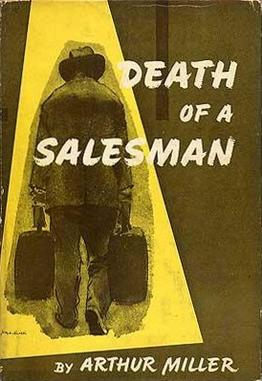This is a sample of a Literature Review on the famous Death of a Salesman. If you need an essay on a book or a movie, visit our BOOK/MOVIE REVIEW page and place your order!
Death of a Salesman Analysis Book Review
The Lomans seem like a typical type of family that we have come across before. Willy Loman is the hard working father, Biff and Happy are two adult sons that seem to be lost in their lives and don’t know where to go, and Linda is the over-caring wife and mother that seems to believe everything is alright within the family, even though everything is falling into shambles. Death of a Salesman is a book that encompasses so many different themes and perspectives, it would be hard to address all of them. However there are two connecting themes that interconnect so strongly, they inevitably affect one another. In the midst of Willy- now in his sixties and reaching retirement- nonetheless losing his mind, we will travel back just like the numerous of flashbacks in the story. The parenting of both Linda and Willy, which will be analyzed thoroughly, bring a form of spotlight to the way the Loman family concludes, internally and externally. The unsuccessful and unhappy future that comes from both sons of Willy show that bad parenting was a major reason to their unreached potential.
Willy Loman is the man of the house in Death of a Salesman. In the play, Willy is reaching an age of exhaustion with a house to pay off and endless work. However, we realize that something seems to be off about Willy, his wife and sons are noticing it too. Happy, the youngest of the two sons states it clearly. “Something’s-happening to him. He-talks to himself.” (10) In a nutshell Willy is losing his mind, and through his frequent flashbacks we come into contact with why. Willy was simply an outwardly “over-confident”, yet insecure man who talked the talk to his children, but never walked the walk. There are three major parenting issues that are wholly connected to the way Biff and Happy were brought up and that is Willy’s self-denial, his desperate need for assurance from others, and his lack of apprehension to his children.
Using lying as a parental technique may be a frequented method by many parents. “Although it has been noted that parents often make false claims to the children within the contexts of fantasy or teasing, almost nothing is known about whether parents do so in other contexts” (Heyman et al., 354) says an article that studied the effects of lying as a parental method. The problem with making false claims to children is that Willy never seems to stop his lying, and in a sense actually believes that he is a very liked man and is regarded highly of, however he complains to his wife that he secretly thinks people actually laugh at him when he enters the office. Such methods show that Willy is not teaching his boys the value of word and in fact is creating a false idol, one which they praise and look up to with so much pride and joy, only to know he is none of what he claims to be. Such claim is clear when Biff catches his father cheating on their mother.
The unfaltering need to be accepted by others is a form of insecurity that stems from not being content with oneself. Willy displays this characteristic very early on in the play and continues with it throughout the entire play. He shows only importance on how well he is liked by everyone (although that is a lie), admires the popularity of his son, and constantly talks down on Charley by telling his sons that “he’s liked, but he’s not-well liked.” (18) Such a vice calls for an alarm in teaching his young boys that they are to be liked by everyone, and in doing so, sows the seeds of growing up afraid of not being liked. Psychologically, this can teach a child that they must do whatever it takes to keep the boss happy, and how ‘ironic’ Happy and Biff are over 30 in the play and are still stuck as employees, not bosses as Willy would like them to be. One can say that Willy’s expectations of his son do not match his own characteristics, and he hopes gravely that his sons will grow up to be the strong man that Willy was unable to become. In an article by Lee Seigel, Seigel states “ruthlessly successful people are not susceptible to guilt” (Seigel, 29) however Willy’s famous line echoes “the competition is maddening!” (23) Willys incessessant want to be liked encougarges his sons to do the same and in turn they grow up trying to heed to his selfish expectations.
It is clear that Willy is not perfect when it comes to caring for his children, and in some sympathetic way this is understandable. However there are particular scenes in the book where we see that the way Willy has parented his children, what he has built himself up to look like and the contradicting actions he has provided them with has turned around to bite them in the future. One scenario was when Willy cheated on his wife and Biff caught him doing it. The mere sight of seeing his father, the man he rose on a pedestal and looked up to, fooling around with another woman was enough to crush Biff. Such things that happened in the past are relevant to the future and we can also see that in the way the boys still believe, even in their 30’s that thinking merely the fact that they are liked will get them somewhere. Such as Biff’s hopes for Oliver and a loan of money. Happy told his brother “I bet he’d back you. ‘Cause he thought highly of you, Biff.” (26). Such thoughts tie in closely to the thought process of Willy and his high hopes for being liked and assisted.
We have seen the way the parenting of Willy have affected Happy and Biff. For one, the exceeding lying and self-denial of Willy created a person that never existed to his loving sons. And when they grew up to see that their father was not all he said he was, they themselves lowered their own values and grew confused as to what an actual man looks and acts like. Willy implanted in both of his sons that in order to move up in life and be all they want to be they need to be liked. This in part caused a psychological shift when they realized that that is only part of the equation when it comes to moving forward in life. The focus on getting the approval of their father and their peers is yet another effect that leaked in from the lessons of papa Willy.
Now we can see the opposite side, and that is the side of Bernard. Bernard is the youngster who admired Biff and was constantly ranting to him about studying in order to pass. Interestingly enough, both Willy and Biff as a high school student ridiculed Bernard because he stuck so much to his books, grades and studying. As an adult Bernard became an important lawyer and one of the top employees to Bernards fathers (Charlie’s) company. Charley is Willy’s neighbor, and Willy once promised to his children “someday [he’ll] have his own business, and [he’ll] never have to leave home anymore.” A very big difference that we see between Willy, he symbolizes failure and the opposite of the American Dream, with Charley and Bernard who both have what Willy wants so badly (success) and their kindheartedness. Willy wants to be everything he does not have the characteristics to be. Even when Howard fires Willy, we see Willy’s attachment to his emotions. He cries out to Charley, “That snotnosed. Imagine that? I named him. I named him Howard.” Where as in Charley, a real business man replies to him “Willy, when’re you gonna realize that them things don’t mean anything? You named him Howard, but you can’t sell that. The only thing you got in this world is what you can sell. And the funny thing is that you’re a salesman, and you don’t know that.” (75)
So how does this all correlate to the parenting technique of Willy and Biff? Surely parenting is not a scratch of the surface type of matter. When it comes to parenting it “encompasses a wide range of attitudes and behaviors directed toward meeting the physical, emotional, and social needs of children” (Grolnik,2009). Here in, Willy only focused on one of these sections with his son Biff, and that was the physical. His parenting based judgment on the amount of people that liked Biff, the amount of girls he obtained, the amount of money he acquired and how happy he made Willy, not himself. Such focus in parenting reflects on the own failings and desires of Willy, and instead of teaching his son how to be less like Willy’s failures he told himself he was succeeding and continued on trying to show his sons what he was not. Willy was caught too far into his emotions to view the emotional and social needs of his children and realize that he was implicating his own faults into his children by teaching them everything that was going wrong with him.
Conclusively, we have seen the deterioration of a family due to the incorrect or rather unconscious act of parenting by the head of the house, Willy. Furthermore, we have seen the same pedestal that Biff and Happy both built for their father, build an illusion of the American Dream. The American Dream that was molded by no one more than Willy himself, for him and his family. His illusion grasped on to his wants for himself and his boys that when he failed to reach his riches and his retirement and payoffs, he brought down his sons right with him. In chasing the dream Willy sunk his family into that same illusion and stamped it with his self titled DREAM. Never did Willy look around and attempt to fix his faults or own up to his own mistakes. Not even when his favorite son caught him with another woman, giving the stockings that belonged to the wife working endlessly for Willy, to a random woman who made him feel good about himself. Feel, that’s all Willy ever wanted to do, is feel good. He thought money would make him feel good, so he enslaved himself to his job. He did not realize that those chains also clung on to the thoughts and upbringing of the son who was watching him like a hero. All in all, we can say that Willy was the perfect symbol for the American Dream. An illusion. And like the illusion that is the American dream, fathering children through an illusion can be very disastrous.
Works Cited
Grolnick, W., & Marbell, K. (2009). Parenting. In H. Reis, & S. Sprecher (Eds.), Encyclopedia of human relationships.(pp. 1208-1211). Thousand Oaks, CA: SAGE Publications, Inc. doi: http://dx.doi.org/10.4135/9781412958479.n390
Heyman, Gail D., Diem H. Luu, and Kang Lee. “Parenting By Lying.” Journal Of Moral Education 38.3 (2009): 353-369. Professional Development Collection. Web. 18 Dec. 2015.
Siegel, Lee. “Willy Loman’s Secret.” Nation 294.18 (2012): 28. MasterFILE Complete. Web. 18 Dec. 2015.
Phelps, H.C. “Miller’s Death Of A Salesman.” Explicator 53.4 (1995): 239. MasterFILE Complete. Web. 18 Dec. 2015.
“Bad parenting a huge issue.” Sydney Morning Herald [Sydney, Australia] 4 Sept. 2012: 10. Academic OneFile. Web. 17 Dec. 2015.
Need your own book review from EssayPlease? Sign up and get $20 off your FIRST order using code NEW20


